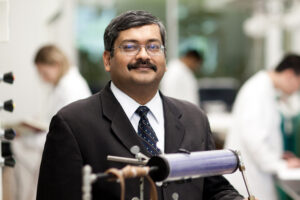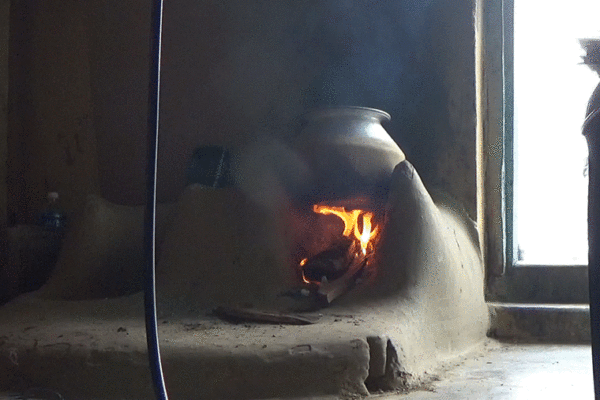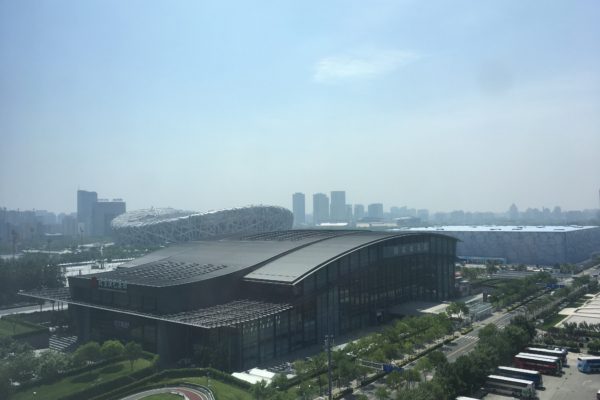In November, air quality in New Delhi reached such dangerous levels that schools closed, flights were cancelled and local authorities declared a public health emergency. News of the city’s heavy smog was covered around the world.
But the future may be brighter, thanks to new opportunities for India’s rising stars in aerosol and air quality science.

On Dec. 16, researchers from the McKelvey School of Engineering at Washington University in St. Louis will join peers at the Indian Institute of Technology Bombay (IITB) to celebrate the opening of the Aerosol and Air Quality Research Shared Facility in Mumbai, along with the launch of a new, joint master’s degree program.
“This will provide an opportunity for students at IITB to engage in cutting-edge research that is very relevant, guided by world leading faculty members from the two institutions,” said Pratim Biswas, the Lucy and Stanley Lopata Professor in the McKelvey School of Engineering. Biswas is also a member of the National Academy of Engineering (NAE) and assistant vice chancellor for international programs at Washington University.
“The work will be relevant to both India and the US,” he said.
The new research facility will join the Surface Particulate Matter Network (SPARTAN), a global particulate matter network, which connects satellite mapping and particulate matter sensor deployment.
It will also bring to the Mumbai campus high-tech instrumentation for fundamental research in aerosol science and engineering, as well as new equipment for on-the-ground air quality monitoring and characterization.
“The research facility offers great potential to rapidly advance understanding of air quality in India, which is of high importance given the elevated concentrations of fine particulate matter that have been observed in the region,” said Randall Martin, professor of energy, environmental and chemical engineering at the McKelvey School and principal investigator for SPARTAN.
Beginning this month, fourth-year students in the IITB bachelor of technology track can apply to a new Aerosols and Air Quality Master’s Degree Program, in collaboration with both universities. Going forward, third-year students will be able to apply. The one-of-a-kind program begins in May 2020.
Not only is the joint nature of the degree unique — with students earning a single degree from both universities — but it is the the only such aerosol science program in engineering offered to students in India.
“I’m excited about educating the next generation of students from India in this field,” said Rajan Chakrabarty, assistant professor of energy, environmental and chemical engineering in the McKelvey School and coordinator of the new program. “This is a real opportunity for Washington University’s aerosol faculty members to have an impact, addressing the air pollution problem in India.”
Washington University Chancellor Andrew Martin and Subhasis Chaudhuri, director of IITB, have both made generous contributions to support the program. In October 2019, they signed a memorandum of understanding to formalize the collaboration. After the first five years, industry, government and other funding sources will help sustain and grow the program.
The highly selective master’s degree program will cover tuition as well as provide a stipend. Students will conduct research in an area of aerosol science and engineering, co-supervised by faculty from both schools. They will spend equal time at Washington University and IITB.
Once they have completed the 30-credit-hour program, students will be encouraged to apply for a co-advised, accelerated PhD program.
This partnership is the latest in a long history of collaboration between the universities, both powerhouses when it comes to engineering education, with standout faculty and students who go on to make important contributions to the field of aerosols.
The school is a key partner in Washington University’s Global Aerosol Network, part of the McDonnell Academy Global Energy and Environment Partnership.
Richard Axelbaum, the Stifel & Quinette Jens Professor of Environmental Engineering Science, and Biswas are both lead faculty members of Washington University’s Center for Aerosol Science and Engineering; they have jointly hosted workshops with IITB. Axelbaum will also be participating in the joint master’s degree program, along with Jay Turner, vice dean for education, and professor of environmental and chemical engineering.
And Biswas, a Mumbai native and department chair of Energy, Environmental & Chemical Engineering in the McKelvey School, worked with Chakrabarty and international partners on a large-scale project to help to reduce the polluting impact of cookstoves, as well as their negative impact on the rural communities that depend on them.
Chakrabarty, a Guwahati native, said working with local students has great advantages when it comes to developing solutions to a large-scale problem such as pollution.
The program brings expertise and state-of-the-art facilities, “And students bring the problems they face every day. They know how important it is to find a solution,” he said.
“You know you are there for a reason, so you come at it with great intensity.”


